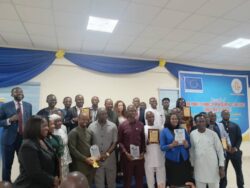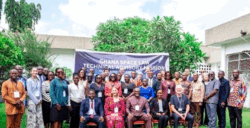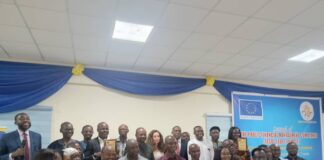By Senyo M. ADJABENG
In recent years, Ghana’s ministerial vetting process has become a focal point of public discourse, drawing attention not only to the qualifications and competencies of nominees but also to the ethical standards governing the interview process.
While the vetting process is designed to ensure that only the most capable individuals are appointed to high office, it has occasionally been marred by the inclusion of illegal or inappropriate interview questions.
These questions often delve into personal matters unrelated to the job requirements, raising concerns about fairness, privacy, and discrimination. Illegal interview questions are those that infringe on an individual’s rights or solicit information that could be used to discriminate against them.
In many jurisdictions, including Ghana, questions about age, marital status, religion, ethnicity, political affiliation, and health status are considered inappropriate and, in some cases, unlawful. Such questions are not only irrelevant to a candidate’s ability to perform a job but also perpetuate biases that undermine merit-based selection.
For example, during Ghana’s ministerial vetting process, nominees have occasionally been asked about their religious beliefs or marital status. While these questions may be framed as attempts to understand the nominee’s character, they risk crossing the line into discrimination.
The 1992 Constitution of Ghana explicitly prohibits discrimination on the basis of gender, religion, and other protected characteristics, making such questions not only unethical but potentially unconstitutional.
What constitutes an illegal interview question?
Illegal or inappropriate interview questions are those that solicit information unrelated to a candidate’s ability to perform the job and could potentially be used to discriminate against them. These questions often touch on personal characteristics protected by law, such as age, gender, religion, marital status, ethnicity, or health status.
I have taken time to list specific questions below to explain how irrelevant such questions are and how unrelated they are to the specific objective of determining the competencies of the interviewee or in the case of ministerial vetting, the nominee.
- Age
- Examples:
- “How old are you?”
- “What year were you born?”
- “When do you plan to retire?”
Age is a protected characteristic in many jurisdictions, including Ghana. Questions about age can lead to age-based discrimination, particularly against older or younger candidates.
- Marital Status and Family Planning
- Examples:
- “Are you married?”
- “Do you have children?”
- “Are you planning to have children soon?”
- “What does your spouse do for a living?”
These questions can lead to gender-based discrimination, as they are often used to assess whether a candidate (particularly women) might take time off for childcare or maternity leave. They are irrelevant to job performance.
- Religion
- Examples:
- “What is your religion?”
- “Do you attend church/mosque regularly?”
- “What religious holidays do you observe?”
Religion is a deeply personal matter and is protected under Ghana’s 1992 Constitution. Such questions can lead to religious discrimination and bias in hiring or appointment decisions.
- 4. Financial Status
- Examples:
- “Do you own a home?”
- “Have you ever declared bankruptcy?”
- “What is your current salary?”
Questions about financial status are irrelevant to a candidate’s qualifications and can be used to discriminate based on socioeconomic background.
- 5. Social and Cultural Practices
- Examples:
- “What kind of food do you eat at home?”
- “Do you participate in any traditional rituals?”
- “What is your tribe?”
Such questions can perpetuate cultural or ethnic biases and are irrelevant to a candidate’s professional qualifications.
However, there can be exceptions to what may be termed as illegal or inappropriate interview questions. Where for example a candidate’s age is in dispute, same may be interrogated by setting the context and proceeding to ask clarifying questions about age.
In the case of financial status for example, specific questions related to evidence of financial malfeasance or corruption or the acquisition of means through fraudulent engagement can be interrogated using the evidence at hand and seeking clarification from the interviewee or nominee on information received about the said matter.
During Ghana’s ministerial vetting process, some of these inappropriate questions have surfaced. For example, nominees have been asked about their religious beliefs, which is irrelevant to their ability to lead a ministry. Questions about marital status or family planning have been posed, particularly to female nominees, which can perpetuate gender bias. In some cases, nominees have been asked about their ethnic background, which risks fueling ethnic divisions rather than focusing on merit.
Illegal or inappropriate interview questions have no place in any recruitment or vetting process, including Ghana’s ministerial vetting. By adhering to ethical interviewing practices and focusing on job-related criteria, Ghana can ensure that its vetting process is fair, transparent, and aligned with the principles of meritocracy and non-discrimination. This will not only strengthen public trust but also attract the best talent to serve the nation.
The inclusion of illegal or inappropriate questions in the ministerial vetting process has several negative consequences. First, it detracts from the primary purpose of the exercise, which is to assess the nominee’s qualifications, experience, and vision for the ministry they are being appointed to lead. When the focus shifts to personal matters, the process risks becoming a spectacle rather than a rigorous evaluation.
Second, such questions can discourage qualified individuals from accepting nominations. The fear of being subjected to intrusive or discriminatory questioning may deter talented professionals from entering public service, thereby depriving the nation of their expertise. This is particularly concerning in a country like Ghana, where the need for competent leadership is critical to addressing pressing developmental challenges.
Third, illegal interview questions undermine public confidence in the vetting process. When citizens perceive the process as biased or unfair, it erodes trust in government institutions. Transparency and accountability are essential to maintaining the legitimacy of democratic processes, and any deviation from these principles can have far-reaching consequences.
Handling illegal interview questions
Handling an illegal or inappropriate interview question can be challenging, especially in high-stakes settings like Ghana’s ministerial vetting process or job interviews. However, there are several strategies a nominee or interviewee can use to navigate such situations professionally and effectively. To handle such illegal interview questions a candidate can do the following;
The key strategy is to stay calm and composed. Reacting emotionally or defensively can escalate the situation and reflect poorly on the candidate. The candidate can take a deep breath, maintain eye contact, and respond in a calm and professional manner. Another technique is to redirect the question. Redirecting the question allows the candidate to steer the conversation back to their
qualifications and job-related topics. Candidate can politely acknowledge the question and pivot to a relevant topic.
For example:
- Question: “Are you married?”
- Response: “I prefer to keep my personal life private, but I’d be happy to discuss how my professional experience prepares me for this role.”
A frontal controlled approach and exertion of confidence is to refuse to answer tactfully. Candidates have the right to decline answering questions that are illegal or irrelevant. A candidate can politely but firmly state that s/he is uncomfortable answering the question.
For example:
- Question: “Do you have any disabilities?”
- Response: “I’m not comfortable discussing my health, but I can assure you that I am fully capable of performing the duties of this role.”
One key approach that works often is to use humour where appropriate. Humor can defuse tension and redirect the conversation without causing offence. A candidate can lightly joke about the question and move on.
For example:
- Question: “How old are you?”
- Response: “Old enough to know better, but young enough to bring fresh ideas to this role!”
During Ghana’s ministerial vetting process, nominees have faced questions about their religion, marital status, and ethnicity in some instances. Take for example the question as below;
Question: “Are you a Freemason?”
And appropriate response could have been; ”I believe my faith is a personal matter. However, I’d be happy to discuss how my values align with the goals of this ministry.” Another question was; “What is your tribe?” And and great response could have been; “I am proud of my heritage, but I am committed to serving all Ghanaians, regardless of ethnicity. My focus is on delivering results for the nation.”
Handling illegal or inappropriate interview questions requires tact, confidence, and a clear understanding of one’s rights. By staying composed, redirecting the conversation, and focusing on qualifications, nominees and interviewees can navigate such situations effectively. Ghana can draw valuable lessons from global best practices in recruitment and vetting. In many countries, interviewers are trained to avoid questions that could be construed as discriminatory or irrelevant to the job.
For instance, the United States Equal Employment Opportunity Commission (EEOC) provides clear guidelines on permissible and impermissible interview questions, emphasizing the importance of focusing on job-related criteria.
Similarly, the United Kingdom’s Equality Act 2010 prohibits employers from asking questions that could lead to discrimination. These frameworks ensure that recruitment processes are fair, transparent, and aligned with the principles of equality and meritocracy. By adopting similar standards, Ghana can enhance the credibility and effectiveness of its ministerial vetting process.
To address the issue of illegal interview questions, the following steps are recommended. Parliament should establish clear guidelines on permissible and impermissible questions during the vetting process. These guidelines should be based on the principles of fairness, transparency, and non-discrimination.
Members of the Appointments Committee should undergo training on ethical interviewing practices. This will help them understand the legal and ethical implications of their questions and ensure that the process remains focused on job-related criteria.
The vetting process should be subject to public scrutiny to ensure accountability. Civil society organizations and the media can play a crucial role in monitoring the process and calling out instances of inappropriate questioning. Where necessary, Ghana’s legal framework should be strengthened to explicitly prohibit discriminatory questions in recruitment processes, including ministerial vetting. This will provide a clear basis for challenging such practices
Ghana’s ministerial vetting process is a cornerstone of its democratic governance, ensuring that only the most qualified individuals are entrusted with leadership roles. However, the inclusion of illegal or inappropriate questions undermines the integrity of this process and risks perpetuating discrimination and bias.
By adopting global best practices and implementing the recommended reforms, Ghana can ensure that its vetting process is fair, transparent, and aligned with the principles of meritocracy. In doing so, it will not only strengthen public trust in government institutions but also set a positive example for other nations to follow.
References:
- Ghana News Agency. “Ministerial Vetting: A Review of Recent Trends and Challenges.” Retrieved from ghananewsagency.org.
- International Labour Organization (ILO) Guidelines on Equal Opportunity and Non-Discrimination.
- The 1992 Constitution of Ghana (Prohibition of Discrimination).
- United Kingdom Equality Act 2010. Retrieved from legislation.gov.uk.
- United States Equal Employment Opportunity Commission (EEOC). “Prohibited Employment Policies/Practices.” Retrieved from eeoc.gov.










